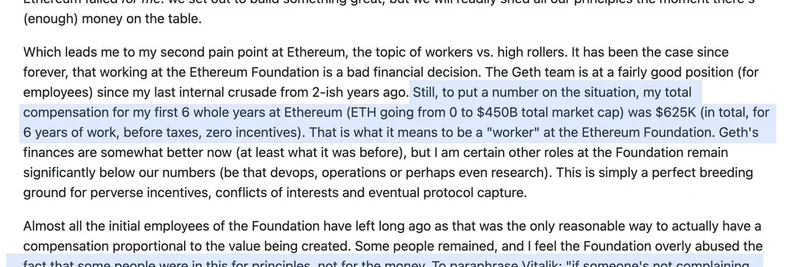In the fast-paced world of cryptocurrency, where billions are made and lost in the blink of an eye, a recent Twitter thread has sparked a crucial conversation about fairness in funding. David Phelps, known on X as @divine_economy, quoted a post from Jason Yanowitz (@JasonYanowitz) that highlights a stark reality: core developers building the backbone of Ethereum are often underpaid, despite their massive contributions.
The thread revolves around a paraphrase from Ethereum co-founder Vitalik Buterin: "If someone's not complaining that they are paid too little, then they are paid too much." Yanowitz points out that the former lead of Geth—a key Ethereum client software responsible for executing transactions and maintaining the network—was paid just $625,000 over six years. That's about $100,000 annually before taxes, a figure that pales in comparison to the billions in value these developers add to the ecosystem.
Phelps doesn't mince words in his response: "adds billions of dollars of value to the chain, paid 100k/year, clearly paid too much." He argues that the term "public goods" in crypto has become a polite way to justify not compensating people adequately for their work. Public goods, for those new to the term, refer to resources or services that benefit the entire community, like open-source code that anyone can use without exclusion—think Ethereum's protocol itself, which powers everything from DeFi apps to meme tokens.
This discussion isn't just academic; it hits at the heart of sustainability in blockchain. Ethereum, as a layer-1 blockchain, supports a massive array of projects, including popular meme tokens like PEPE or DOGE-inspired variants that thrive on its secure and decentralized infrastructure. But if the core maintainers aren't fairly compensated, who keeps the lights on? Replies to the thread echo this sentiment, with users like @pseudotheos noting that anything labeled "public" tends to be underfunded, from public transport to public services.
One reply from @trent_vanepps, involved with Protocol Guild—a funding organization for Ethereum core devs—dives deeper. He suggests the Ethereum Foundation (EF) should aim for at least $30 million annually to fund around 200 developers at a bare minimum of $150,000 each. That's still below industry standards, especially when you factor in equity or token incentives offered by private companies. He explores options like staking yields or community funding but stresses the need for consistent, in-protocol mechanisms to avoid reliance on volatile market donations.
For meme token enthusiasts and creators, this is a wake-up call. Meme coins often ride on the waves of hype and community, but they depend on robust underlying tech. Imagine if underfunded devs lead to network slowdowns or security issues—your favorite pump could turn into a dump overnight. Projects like those supported by Jokerace (jokerace.io), where Phelps is a co-founder, show how governance and funding can be democratized through contests and community votes, potentially offering models for better public goods support.
As blockchain practitioners, we need to rethink how we value contributions. Is "public goods" just code for exploitation, or can we build systems where creators are rewarded proportionally? Threads like this (original post here) remind us that behind every token and transaction are people whose work deserves fair pay. If we're serious about decentralizing finance and power, let's start by decentralizing the wealth a bit more equitably.


